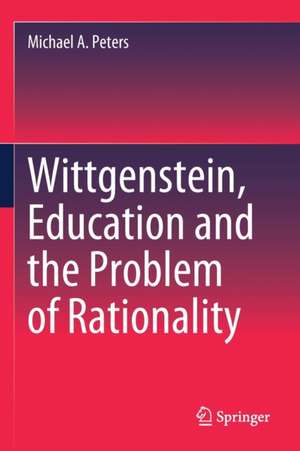Wittgenstein, Education and the Problem of Rationality
Autor Michael A. Petersen Limba Engleză Paperback – 22 ian 2022
| Toate formatele și edițiile | Preț | Express |
|---|---|---|
| Paperback (1) | 725.13 lei 6-8 săpt. | |
| Springer Nature Singapore – 22 ian 2022 | 725.13 lei 6-8 săpt. | |
| Hardback (1) | 731.10 lei 6-8 săpt. | |
| Springer Nature Singapore – 22 ian 2021 | 731.10 lei 6-8 săpt. |
Preț: 725.13 lei
Preț vechi: 884.30 lei
-18% Nou
Puncte Express: 1088
Preț estimativ în valută:
138.76€ • 145.06$ • 117.26£
138.76€ • 145.06$ • 117.26£
Carte tipărită la comandă
Livrare economică 06-20 martie
Preluare comenzi: 021 569.72.76
Specificații
ISBN-13: 9789811599743
ISBN-10: 9811599742
Ilustrații: XIV, 247 p. 1 illus.
Dimensiuni: 155 x 235 mm
Greutate: 0.37 kg
Ediția:1st ed. 2020
Editura: Springer Nature Singapore
Colecția Springer
Locul publicării:Singapore, Singapore
ISBN-10: 9811599742
Ilustrații: XIV, 247 p. 1 illus.
Dimensiuni: 155 x 235 mm
Greutate: 0.37 kg
Ediția:1st ed. 2020
Editura: Springer Nature Singapore
Colecția Springer
Locul publicării:Singapore, Singapore
Cuprins
Part I: Historical Background.- Introduction: Conceptions of rationality.- Chapter 1. The problem of rationality and the tradition of philosophy-as-epistemology.- Part II: Rationality and philosophy of education.- Chapter 2. The autonomy of analytic philosophy of education.- Chapter 3. Three theories of knowledge in education.- Part III: Constitutive rationality and historicism.- Chapter 4. The force of historicism in the philosophy of science.- Chapter 5 Hermeneutics, social theory and education.
Notă biografică
Michael A. Peters is Distinguished Professor of Education at Beijing Normal University Faculty of Education PRC, and Emeritus Professor in Educational Policy, Organization, and Leadership at the University of Illinois at Urbana–Champaign, where he was appointed as Excellence Hire Professor. He has also held positions at the University of Canterbury, and the University of Waikato, and held a Personal Chair at the University of Auckland (2000-2005) where he is currently Honorary Senior Research Fellow. He is the executive editor of the journal, Educational Philosophy and Theory (https://www.tandfonline.com/loi/rept20) and founding editor of five international journals. His interests are in educational philosophy and theory and he has written over one hundred books, including Post-Truth, Fake News (eds. Springer, 2018), Education and Technological Unemployment (eds. Springer 2019) and The Chinese Dream: Educating the Future (Routledge, 2019). He edited the Springer Companion to Wittgenstein and Education: Pedagogical Investigations (2017) and Wittgenstein’s Education: ‘A Picture Held Us Captive’ (with Jeff Stickney, Springer, 20017). He has acted as an advisor to governments in the USA, Scotland, NZ, South Africa, UNESCO and the EU. He was made an Honorary Fellow of the Royal Society of NZ in 2010 and awarded honorary doctorates by State University of New York (SUNY) in 2012 and University of Aalborg in 2015.
Textul de pe ultima copertă
This book develops an argument for a historicist and non-foundationalist notion of rationality based on an interpretation of Wittgenstein of the Philosophical Investigations and On Certainty. The book examines two notions of rationality—a universal versus a constitutive conception – and their significance for educational theory. The former advanced by analytic philosophy of education as a form of conceptual analysis is based on a mistaken reading of Wittgenstein. Analytic philosophy of education used a reading of Wittgenstein’s philosophy of language to set up and justify an absolute, universal and ahistorical notion of rationality. By contrast, the book examines the underlying influence of the later Wittgenstein on the historicist turn in philosophy of science as a basis for a non-foundationalist and constitutive notion of rationality which is both historical and cultural, and remains consistent with wider developments in philosophy, hermeneutics and social theory. This book aims to understand the philosophical motivation behind this view, to examine its intellectual underpinnings and to substitute this universal conception of rationality by reference to a Hegelian interpretation of the later Wittgenstein that emphasizes his status as an anti-foundational thinker.
Caracteristici
Provides historical background and context for understanding Wittgenstein in analytic philosophy of education Examines the methodological limitations of analytic philosophy of education Proposes Wittgensteinian-inspired research programme in educational philosophy and theory
